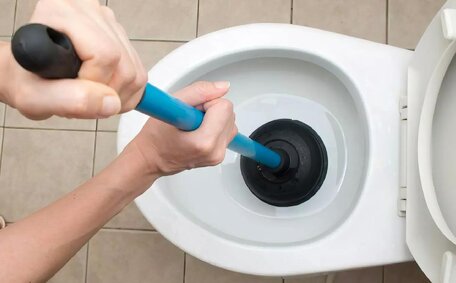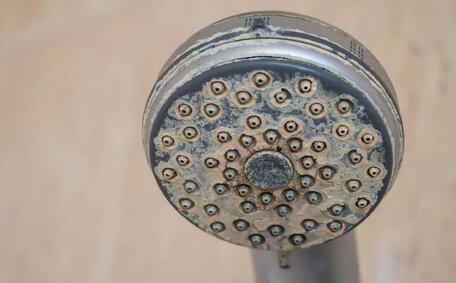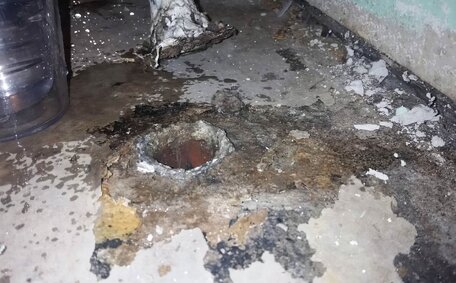Common causes of blocked drains in restaurants and cafes
Blocked drains in restaurants and cafes typically start in the sink and have common causes similar to residential issues:
- Build-up of fats, oils, and grease (FOG) - FOG can stick to the walls of your drains and pipes, eventually causing blockages, especially since commercial kitchens produce significant quantities of FOG.
- Food waste - Small food particles, including rice, pasta, and vegetables, can accumulate in kitchen drains and create clogs after being washed down the sink.
- Foreign objects - Straws, utensils, and napkins that inadvertently enter sink drains and toilets can cause blockages.
- Tree roots - Invading roots from adjacent trees can penetrate your drains and plumbing, resulting in severe blockages.
- Pipe issues - Age, damage, incorrect installation, or inadequate size can all contribute to debris accumulation and blockages.
Employing drainage services for grease trap installation and regular maintenance is crucial to protect the plumbing systems of restaurants and cafes. Educating your staff on proper waste disposal procedures also can help prevent any issues. Taking early action, looking out for early warning signs, prevents major headaches with your drains down the road.
Preventing blocked drains with proper kitchen practices
To maintain an operational kitchen, adopt these practices to prevent blocked drains:
- Install adequate grease traps paired with drain strainers, and periodically flush with boiling water. Grease traps capture FOG, a primary cause of blockages, before it reaches the drainage system, while strainers trap food particles.
- Scrape plates and correctly dispose of cooking oil and food scraps to maintain unobstructed flow in your plumbing, rather than allowing them into the drain.
- Educate staff on waste disposal - Training kitchen staff to manage grease and properly dispose of food waste is vital, as highlighted by the 'Can the Grease’ campaign.
- Conduct routine maintenance and drain inspections; use CCTV drain surveys to identify problems early and high-pressure hot water cleaning to eliminate blockages.
- Educating your employees - Ensure that your staff properly use enzyme and bacteria drain additives to break down waste before drains can become clogged.
The best way to keep your plumbing system efficient is adopting practices free of obstructions that could cause pipe damage, unpleasant smells, and health regulation infringements. A proactive strategy avoids issues and keeps your drains clear.
Installing and maintaining grease traps
Efficient installation of grease traps is vital for drainage in your commercial kitchen. Their key function is to intercept grease and oil waste before it reaches the sewer system, preventing severe blockages.
Legislation mandates that food service establishments install approved grease traps, ensuring operations run smoothly. The FOG separates and rises, while food particles settle, preventing blockages and ensuring smooth operation of the restaurant’s drainage system.
Typically positioned outside and underground, regular maintenance of your grease trap—a key component of your business’s plumbing—can prevent clogs.
Installing a Grease Trap
When installing a grease trap, consider what can affect the following:
- Choosing the right size for your grease trap based on connected fixtures and daily flow is crucial.
- Allowing enough space for easy access and cleaning
- Ensuring connections to all food-related kitchen fixtures, incorporating your kitchen drain, dishwashers, and floor drains
- Locating the inlet and outlet properly so flow moves from one end to the other
- Ensuring proper ventilation for your property
Maintaining a Grease Trap
To maintain your commercial grease traps optimally:
- Arrange for grease trap cleaning and maintenance ideally every fortnight during busy seasons or monthly, and consider professional services like those from Emu Plains Plumbing when required.
- Scrape or wipe trapped solids from internal surfaces
- Ensure baffles and air-relief valves are functioning
- Check water seals are intact with no sign of cracking
- Confirm structural stability and that all lids and access points have secure fittings
- Utilise hot pressurised water, manual scrubbing, drain additives, or vacuum extraction for cleaning.
Maintaining your grease trap is essential to prevent hazardous grease overflows and blockages in your drainage system.
Effective drain cleaning methods
There are several effective methods for cleaning clogged drains in restaurants and cafes, including:
Enzymatic Drain Cleaners
Enzyme-based drain cleaners are better than other cleaners at tackling grease, fats, carbohydrates and other debris using bacteria and natural enzymes. They are safe for pipes but can take some time to work.
High-Pressure Water Jetting
Professional hydro jetting, a method of commercial drain cleaning, uses highly pressurised water to clear tough blockages effectively.
Plungers
Utilise a plunger with rhythmic up-and-down motions to dislodge blockages in drains.
Snaking the Drain
Snaking involves sending a long bendable rod down the pipes to hook and extract debris. For a commercial drain, however, more powerful motorised augers are needed to adequately remove clogs.
To prevent blockages and ensure smooth drainage in commercial kitchens, combine jetting, enzymatic treatments, and regular monitoring. Should you encounter any plumbing problems, don’t hesitate to call out to us at Emu Plains Plumbing for adept assistance from a call professional.
Professional drain and pipe inspections
It’s important for restaurants and cafes to periodically conduct professional drain and pipe inspections. A drain survey can identify hidden issues that can lead to blocked drains, like small leaks, cracked pipes or deterioration over time.
During an inspection, a licensed plumber expertly utilises specialised CCTV drain cameras to thoroughly assess the condition of underground sewer lines as well as the internal pipe system. Any plumbing issues like built-up sediment, intruding roots or structural faults will be clearly visible.
Conduct pipe inspections every 6-12 months to catch and address issues before they become problematic. Identifying issues like minor pipe cracks or joint separation can allow for timely repairs, preventing more significant problems. Being proactive is key, so reach out for prompt assistance. being proactive aids restaurants not only in saving time but also money as well as ensuring issues are addressed soon as possible, avoiding headaches down the road.
The expert team at Emu Plains Plumbing can provide detailed drain and pipe surveys to keep a restaurant’s plumbing system operating optimally. Identifying and addressing issues promptly is key so your system can ensure efficient waste drainage and prevent emergency blockages.
Calling a plumber for persistent drain issues
Blocked or sluggish drains can escalate into major concerns, disrupting operations and presenting health risks in food service environments. If the drain remedies and maintenance efforts you’ve got don’t resolve persistent drainage problems, it’s crucial to visit our website or our skilled drain plumber at Emu Plains Plumbing for assistance.
Warning Signs It’s Time to Call a Plumber
Signs that a drain problem requires professional help include:
- Water that backs up or overflows from your sinks, toilets, or any floor drain
- Strong sewage odours coming from drains
- Multiple drain blockages keep recurring despite attempts at clearing
- CCTV drain inspection reveals extensive buildup, pipe damage or root intrusion
How Emu Plains Plumbing Can Help
When restaurant drainage issues persist, Emu Plains Plumbing has the equipment and expertise to diagnose and resolve the problem. Services include:
- High-pressure hydro jetting that can quickly get rid of stubborn drain obstructions
- Sewer line and pipe inspections using CCTV cameras to identify issues
- Repairing damaged drains and pipes
- Professional drain maintenance and cleaning
- Fixing leaks, installing new sinks and other plumbing repairs
Don’t let ongoing drain headaches disrupt your restaurant operations. In urgent need of assistance or seeking to find out more about our maintenance options? Give our team a call today to uncover more about our support options.
Long-term solutions for drainage systems
Implementing long-term solutions can greatly improve your restaurant’s drainage infrastructure, enhance operational efficiency and ensure compliance with wastewater regulations.
Drain Relining
Drain relining, involving an epoxy resin coating on pipe interiors, is an effective way to refurbish old or damaged drains, providing a smooth, protective barrier against corrosion and buildup.
Drain relining offers numerous benefits:
- Relining eliminates the need for excavation and pipe replacement, streamlining grease trap installation.
- Long lifespan of 50+ years
- Resists damage from tree roots and chemical exposure
- Increased flow capacity
- Reduced drain blockages
Installing Larger Grease Traps
Expanding restaurants or those updating menus may need to install larger grease traps to accommodate increased wastewater. Traps should be sized correctly based on the number of connected fixtures.
Benefits include:
- Adequate capacity to handle peak oil grease wastewater flows
- Lower risk of overflows into the public sewer
- Enhanced separation of fats, oils and grease
- Easier compliance with trade waste regulations
Adding More Grease Traps
Installing additional smaller grease traps throughout a kitchen, especially near areas producing heavy grease, ensures effective management and compliance.
This provides:
- Targeted grease interception from each area
- Balances flow distribution for optimum efficiency
- Built-in redundancy if one trap goes out of service
Upgrading drainage infrastructure requires professional planning and installation but pays dividends through years of trouble-free operation.






